Huwara, West Bank – A week after hundreds of extremists settled wreaked havoc In response to a deadly terror attack in the northern West Bank town of Huwara, and the army subsequently ordering storefronts to close, local Palestinians have begun to get back on their feet, but tensions remain high.
On a visit to Huwara on Sunday afternoon, jawans were seen guarding in pairs at every 100 meters. Some were on the ground near the traffic circle, and others were watching from the balconies of buildings seized by the military.
Army posts at the entrances to the city, as well as along the inside wall, were plastered with posters by the settlers demanding the army “crush” their enemies.
“The Intifada is here. We demand to crush! We demand an answer with war! read a poster.
Another had a quote from the Book of Esther, or “Megillah,” to be read during the Purim holiday this week: “The Jews took possession of those who hated them.”
The Nablus-region city, home to about 7,000 Palestinians, was bustling for the first time in a week, but the atmosphere was a bit more muted than usual.
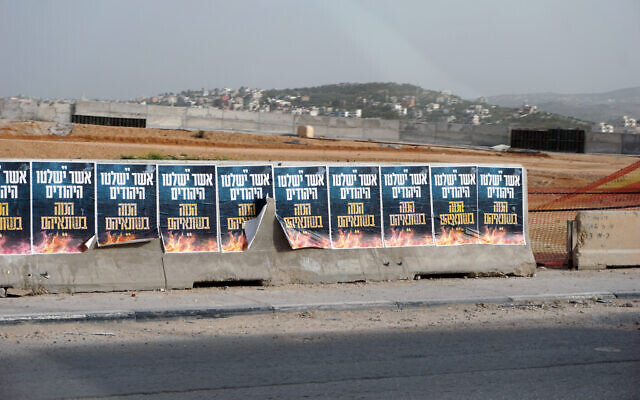
A sign reads ‘Jews overcame those who hated them’ in the West Bank city of Huwara on March 5, 2023. (Emmanuel Fabian/The Times of Israel)
A week ago, the place was a “warzone”, said Iyad Mohreb, owner of a car scrapyard and repair shop on the northern edge of Huwara, which was heavily damaged during riots on the evening of 26 February.
About 400 radicalized residents burned homes, cars and storefronts, and attacked Palestinians, injuring several and killing one Palestinian man. under unclear circumstances,
The unprecedented riots came in response to the killing of two Israeli brothers from the nearby settlement of Har Bracha as they were driving on the Route 60 highway in Huwara several hours earlier.
After the shooting attack, which killed 21-year-old Hallel Yaniv and 19-year-old Yagel Yaniv, the army ordered the closure of all Palestinian shops, apparently to prevent clashes between settlers and locals.
All Palestinian-owned stores opposite the highway remained closed as of Friday evening. During the previous week, soldiers enforcing the shutdown detained some Palestinians who sought to enter their businesses.
Mohareb, whose office windows were smashed, and car parts were left outside, said the decision to force him to remain closed for nearly a week was “collective punishment”.
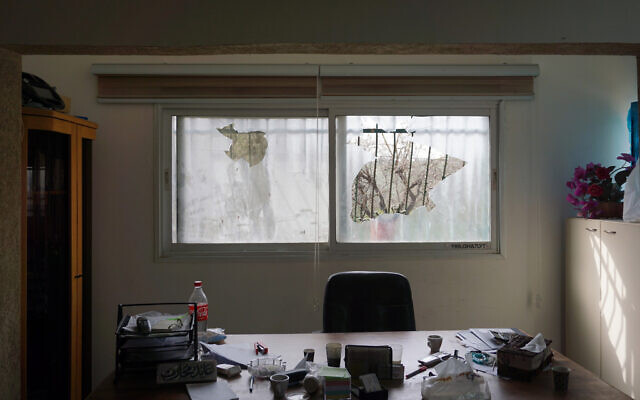
Windows are seen smashed by stones thrown by settlers at an office in the West Bank city of Huwara on March 5, 2023. (Emmanuel Fabian / Times of Israel)
“But what’s a week without work? They burned everything, when can I even go back to work?” Mohreb told The Times of Israel from his office.
“This is collective punishment. After all this damage done by the violence of the settlers, and then the army comes and imposes collective punishment on the residents and the shopkeepers,” he said.
The stones that the settlers had thrown at the windows of his building were still on the floor, as well as shards of glass from the broken windows.
Looking at the charred remains of scrap cars and vehicle parts, Mohreb said it would take years to recover if he was not reimbursed.
A stack of car doors that had been saved from the blaze had all their windows smashed out.
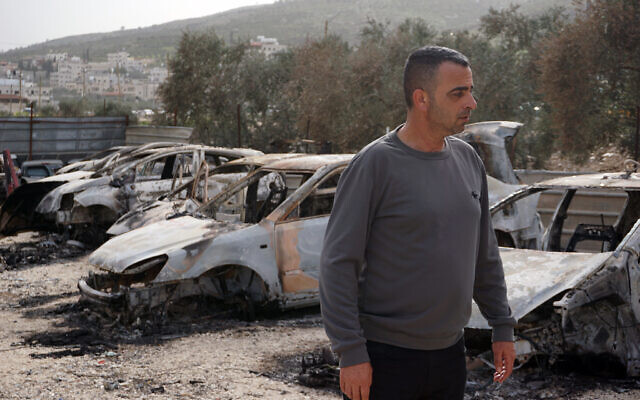
Iyad Mohreb looks at scrap cars and vehicle parts damaged by Israeli settler extremists during riots in Huwara, a week ago, March 5, 2023. (Emmanuel Fabian/The Times of Israel)
Mohreb said he feared the settlers would return to harm him. An article published after the riot by Hakol Hayehudi, an online mouthpiece based in Yitzhar, accused Mohreb of being a terrorist.
Mohreb said a photograph published on the site was taken in 1993 of a man waving a firearm during a celebration of the Oslo Accords between Israelis and Palestinians in Jericho. “They say I am a terrorist. It is me in the picture but a long time ago. I too was arrested 20 years ago, but who hasn’t been arrested?” They said.
Munir Qaddous, an activist from the nearby village of Burin who often works with the left-wing Yesh Din organization, told The Times of Israel that “every house here, from Yizhar Junction to Beita Junction, was hit by the settlers.”
Asked if he feared the army would permanently close the shops if violence broke out again, Qaddous said there was no chance residents would obey such an order.
“We are not walking or moving as Palestinians. The army can come with their guns and force and close the stores for a day, two, three, four, five, a week, 10 days. Maybe, but we will not give up.
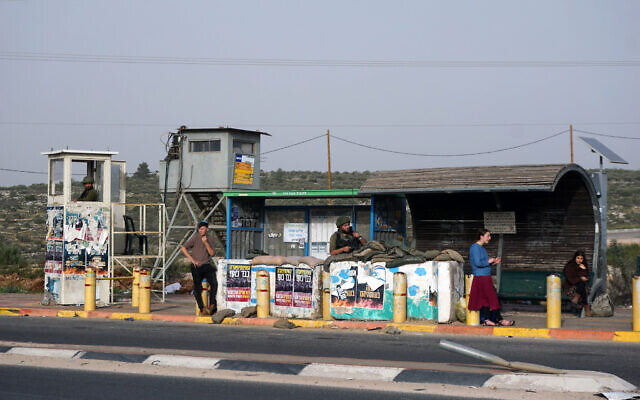
Soldiers stand guard at a bus stop at Tapuch Junction in the West Bank, south of Nablus, on March 5, 2023. (Emmanuel Fabian/The Times of Israel)
Of the 16 suspects detained in the riot, all but two were remanded to administrative detention, a controversial practice that allows individuals to be detained practically indefinitely without charge. allows, and the evidence against them is withheld.
The military said at the time that “violent riots that broke out in several places” in the West Bank were being “dealt with” by soldiers and police officers, without mentioning the identities of those involved.
Nevertheless, military chief Herzi Halevi publicly condemned the riots and vowed to investigate the circumstances. Yehuda Fuchs, the top general of the West Bank, called The stampede of the settlers is a “massacre”.
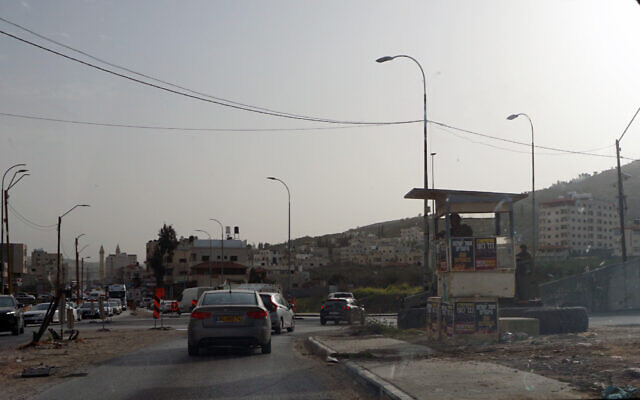
View of Yitzhar Junction in the northern West Bank city of Huwara on March 5, 2023. (Emmanuel Fabian / Times of Israel)
Kaddus said Huwara’s residents were beginning to recover after weeks of violence and a military-imposed shutdown.
“But people here are worried, scared, it might happen next time. Next time it will be worse, and more violent,” he said.
“The settlers have learned that they can get away with it.”